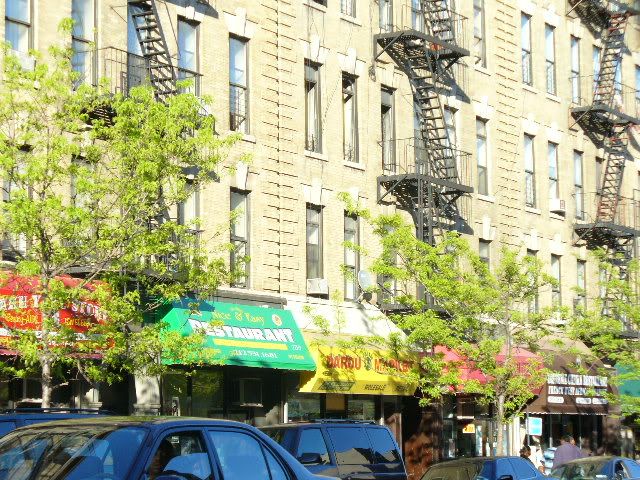
Colbert inspired me to create some original "art." Going back to my audio verite project: Last week I parked a few blocks away from my school on 116th Street, between St, Nicholas and Frederick Douglas. It was an amazing block-all African stores and restaurants. When I was going home I "strapped on" my mp3 recorder and tried to immerse myself. I was thirsty and got a drink in one of the stores. That's me sneezing as the heavy scent of the spices hit me. Then I took some photos when I got back to my car. In order to bolster the sparse sound track I mixed the ambient noise with a segment of a Senegalese song, "Manu Chao Amadou et Mariam-Senegal Fast Food." My research found that the African flavor of the block is largely Senegalese. I also found some additional images and info on the web. The Little Senegal movie seems interesting, but it's unavailable. Here's the resulting slide show. Here's some additional info from an nyu little voices interview project done a few years ago:"The following information is a case study on Mrs. Madjiguene she is a Senegalese native who moved to the United States in 1989. Upon arriving in America Mrs. Madjiguene moved to the African neighborhood in Harlem mentioned above. This interview discusses Mrs. Madjiguene's linguistic history, her experiences in Senegal and her experiences in America.
Question: What is your linguistic background? What languages did your parents use and teach you while growing up? Answer: I was born Senegalese so the language I grew up speaking was Wolof. There are many ethnic languages in Senegal, however Wolof is the main/national language. Since Senegal was a colony of France the official language of Senegal which is taught in school is French. Senegal gained independence from France on April 4, 1960. My mother spoke Wolof and my Father who is from Mali (a neighboring country) spoke Bambara, French and Fulani. My father spoke to us in French because children needed to know French before they went to school. French is taught in kindergarten, so if you had educated parents they would speak to you in French. If your parents were not educated then you would speak only Wolof until you learned French in school.
Question: Can you explain the linguistic situation in Senegal? What is the communication like between Senegal and other countries? Answer: Well, there is French Africa and English Africa they are called Franco-Africa and Anglo-Africa. West Africa which includes the countries of Senegal, Ivory Coast, Guinea, Mali, Togo and Benin were all French colonies so French is the official language. Countries like Nigeria, Ghana, South Africa, Kenya and Tanzania were British colonies so their official language, in addition to their national languages, is English. We can all communicate in French and English, but communication is rather difficult among Africans because there are many ethnic groups. For example, the Ivory Coast has about one hundred ethnic groups, Nigeria has a little more than one hundred ethnic groups and Senegal has about five main ethnic groups. These ethnic groups are the Bambara, the Jola, the Fulani, the Wolof and the Hassaniyya. In Senegal, English is mandatory but I am not sure if French is mandatory in Nigeria. In Senegal you learn French and English in school, so before I came to United States I was already speaking English.
Question: Do you ever hear Wolof spoken in this community? Answer: Yes, all of the time I hear Wolof spoken in the streets, on the trains, downtown and at the supermarkets.
Question: Do you label the languages based on the ethnic groups? Are the ethnic languages described by the area where the ethnic group is historically from? Answer: Yes, in Senegal labeling is easy because when you have a country with a national language like in Senegal everyone speaks Wolof. For example, the Jola, the people from the south and the people from the north all speak Wolof and they also speak French. However, in the Ivory Coast (a neighboring country) the people have to speak French because they don't understand each other. The people develop a type of urban French they call it Le Petit Biyan which is like a creole. This urban French is spoken in the markets and in the streets and it is not educated French. They have this problem everywhere in Franco-Africa except for Senegal. The other Franco-African nations have to speak the official language to understand each other.
Question: Does your son speak Wolof? Answer: Yes he does, but it is a type of Wolof I don't understand very well because he has an accent. I tell him 'this is not how you speak Wolof you're losing your Wolof accent' but what can I expect he was born in America and lives in the American enviroment.
Question: Does your son speak French? Answer: No, he doesn't speak French anymore. He used to but I no longer speak French with him. I shout to him English and whenever I speak French to him he answers me in English. So, I say to myself teaching him French is too difficult so I should forget about it. I also have not been speaking a lot of Wolof with him...I should not be doing this. [laughs]
Question [To Son]: In your school are there a lot of people who speak Wolof or does everyone speak English? Answer: A lot of people in my school are in the International class. A few of my friends are from the Wolof ethnic group and are in the International class. [He attends The Booker T Washington Junior High School which is located on 108th Street and Amsterdam Avenue.






No comments:
Post a Comment